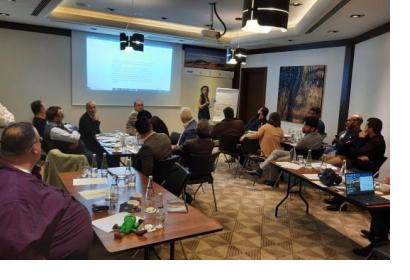UN-SPIDER conducted a training programme on Combatting Disaster in Arid Regions Using Space-Based and Geospatial Technologies from 18 to 20 February 2020 in Istanbul, Turkey. The event was the first attempt of broadening UN-SPIDER efforts to include countries in a vast swath of arid regions in Asia and North Africa, and to increase awareness of the need for space technology to combat disasters in the context of a changing climate and growing populations. The programme was jointly organised with Delta State University, a Regional Support Office of UN-SPIDER. The Disaster and Emergency Management Presidency of Turkey (AFAD) provided the local support as the host agency.
A total of 22 participants from 11 countries attended the training. They included participants from Afghanistan, Azerbaijan, Islamic Republic of Iran, Jordan, Kuwait, Pakistan, Armenia, Turkey and Egypt and experts from UN-SPIDER, Delta State University, the Iranian Space Agency, the International Centre for Agriculture Research in the Dry Areas (Egypt) and AFAD (Turkey).
The objectives of the meeting were to explain the role of technology in disaster management; match data requirements to potential data sources; list major space agency partners and the platforms available for disaster management support; identify free resources for creating map products; identify stakeholders involved in disaster management and describe the customization of map products to meet needs; and create a map product for a given disaster risk reduction and/or response scenario.
Upon completion of this workshop, attendees were able to list and describe the major phases of the disaster management lifecycle; describe the fundamental goals and objectives of disaster management in the context of the Sendai Framework for Disaster Risk Reduction; draw a representative diagram for the organizational structure for disaster management optimized for their nation; identify resources available to assist with the development of disaster management plans and policies; explain the role of space-based technologies for each major phase of disaster management; identify United Nations programmes and appropriate regional partners which facilitate the collection and sharing of space-based information for disaster management; match the appropriate type of remote sensing data; and/or product to disaster type and list critical foundation datasets required for successful use of space-based technologies for disaster management. The participants also learned about becoming an authorized user of the International Charter “Space and Major Disasters”.
The participants also visited the İstanbul AFAD Disaster and Emergency Management Headquarters and received demonstration at the AFAD Crisis Management Center (for Turkey Disaster Response Plan Service Groups), İstanbul AFAD Call & Communication Center and İstanbul AFAD Mobile Coordination Vehicles.
The training also generated awareness about the services offered by UN-SPIDER and the participants from several countries showed keen interest in engaging with UN-SPIDER. The UN-SPIDER programme will continue its engagement with this region to develop better partnerships in promoting the use of space-based information in disaster management and emergency response.


